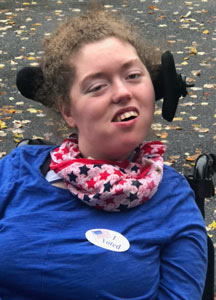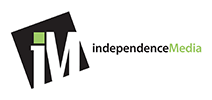About Haley Shiber

Interview conducted July, 2020
Location: Zoom
Haley F. Shiber is an Augmentative and Alternative Communication User, Storyteller, Artist, Exercise enthusiast, Advocate
Haley has been an active Augmentative and Alternative Communication user since she was 12 months old starting with pic symbols and gradually advancing as she aged. She has used many different devices over the years. Currently, she uses an Accent 1400 for her voice with the Minspeak Unity Language system. She accesses her device using a head switch mounted by her left cheek. The device uses a specialized automatic scanning pattern she has memorized. With her low vision but vast vocabulary she uses an auditory prompt in her right ear to hear each symbol she scans as she goes.
Haley is an art enthusiast, creating new paintings every week with her art friends in Art Therapy Express. She loves reading and is starting a new business to promote advocacy and literacy. She enjoys Zooming with her Temple University ACES friends, working hard on projects and committees through the ACES Program.
When Haley is not working on her dream of entrepreneurial opportunities, she can be found zooming family and friends, gardening, reading the classics, riding her adapted bike, enjoying music of many genres, walking on her treadmill in her walker, text messaging, emailing, watching movies, and creating art on Zoom. She is a very determined and hard worker. She participates in occupational therapy, speech therapy, physical therapy and helps undergraduate students at the University of Delaware learn more about people with disabilities. She is a proud advocate and is on many committees to represent the disability community.
Hali Strickler is the AAC Services Coordinator for TechOWL, a program of the Institute on Disabilities at Temple University. Hali provides AAC and assistive technology supports and services to individuals with complex communication needs. Hali is a licensed and certified speech-language pathologist with experience in the public school setting.
Haley's Story
Hali
Haley, what was a typical day like for you before COVID-19?
Haley
Before COVID-19 I went to the YMCA to [?] and exercise with my friends at Zumba and chair yoga. I talked with friends and socialized. I visited the art studio and saw my old friends. It was fun. I spoke at legislative hall as an advocate. I went out to dinner with my family and visited my grandmother and other family. I went to the movies with my friends. I was always out and about.
04:13
Hali
Describe your day now. What has changed?
Haley
During Covid-19 I have had to stay in my house. I am not able to go to the YMCA or art studio. I Zoom meet with my art friends to create art. I Zoom with my YMCA friends to see them. I Zoom meet with my Temple University friends. I cannot visit my family. It makes me feel lonely and sad. I miss my family and friends, but I get excited to text and video call them and see pictures. I can’t see them, so I text them more. Thank goodness for technology or I would not see anyone.
Hali
How do you communicate and stay connected with your friends, loved ones and community?
Haley
I communicate using text messages, Zoom and video calls on various apps. I have more time to put my thoughts together. I love having more time. Virtual platforms are very accessible. I hope they continue – they’re awesome. I feel most connected when I see people and virtual meetings have been great. But I do miss seeing people in person, but virtual comes pretty close.
I have a decrease in my trach medical supplies. There’ve been shortages in the nation. I need to change them to not get sick; one of my tubes was growing mold. I have had to decrease my care staff to keep my family and I safe. My family help to care for me overnight, now.
Hali
Haley, describe the challenges that you are facing due to COVID-19 as far as your medical care, attendant care, education, medical equipment and employment. Are you able to follow the social distancing rules and what resources do you turn to for information?
Haley
I am going through some challenges. I listen to the Governor [of Pennsylvania] and CDC for information. I have been following the rules and staying safe with social distancing. I have a decrease in my trach medical supplies. There’ve been shortages in the nation. I need to change them to not get sick; one of my tubes was growing mold. I have had to decrease my care staff to keep my family and I safe. My family help to care for me overnight, now. I am very thankful they can help me stay safe. I am having Zoom meetings to start my literacy and advocacy business, but it is hard not being able to be around crowds. I plan to read and speak to students.
Hali
How should the COVID 19 crisis affect disability policy and advocacy? What has surprised you in this present moment and what brings you joy?
Haley
There is still a lot of work to be done for advocacy of people with disabilities. It surprised me that people with disabilities in some states would not have received medical treatment in the pandemic if they had COVID-19 due to lack of space in hospitals. That was scary. People with disabilities deserve medical treatment whenever they need it, even in a national pandemic. We have to keep advocating for rights of people with disabilities.
I have joy when I am with my family and friends. I love the feelings creating art, exercising at the YMCA, the shore, and riding my bike.
Institute on Disabilities
The Institute on Disabilities at Temple University is one of the sixty-seven University Centers for Excellence in Developmental Disabilities Education, Research and Service funded by the Administration on Developmental Disabilities, U.S. Department of Health and Human Services. Located within the College of Education and Human Development at Temple University, the Institute is a vibrant, diverse organization with more than 40 staff members, including students and is considered a national leader in disabilities, policy analysis and inclusive education.
About the Project

This project was made possible with generous support from the Independence Public Media Foundation.
The Disability and Change Symposium is available as a free online learning module.
Combating Implicit Bias: Employment

About this year's theme
Employment statistics for persons with disabilities continue to be disappointing, ~19% compared to ~66% of peers without disabilities. (US Bureau of Labor Statistics, 2018). We ask ourselves, "is there something beyond overt discrimination and access that perhaps we need to address? Are there silent barriers such as those created by implicit bias?"
Most of us believe that we are fair and equitable, and evaluate others based on objective facts. However, all of us, even the most egalitarian, have implicit biases – triggered automatically, in about a tenth of a second, without our conscious awareness or intention, and cause us to have attitudes about and preferences for people based on characteristics such as age, gender, race, ethnicity, sexual orientation, disability, and religion. These implicit biases often do not reflect or align with our conscious, declared beliefs.(American Bar Association, Commission on Disability Rights, "Implicit Bias Guide," 2019)
This year's theme challenges us to each ask ourselves "What implicit bias(es) do we have and encounter, and how do we recognize them and move beyond them to create opportunities, welcome, and full participation for all?"
As always, this Symposium privileges first-person voices and experiences.
About the Disability and Change Symposium
The stated goal of the annual Symposium is "to create conversation that transcends any one-dimensional depiction of people with disabilities, and foregrounds the multidimensional lives of our speakers - as writers, educators, performers, and advocates."
The Disability and Change Symposium is a one-day, interdisciplinary conference focusing on cultural equity and disability. The event is free, accessible and open to the public.
Acknowledgments
Organized by the Institute on Disabilities at Temple University, the Symposium is an outcome of collaboration with the Interdisciplinary Faculty Council on Disability whose mission is "to foster collaboration across Temple University on disability-related projects including research, teaching, programming, publication, and grant-seeking. By connecting with one another, Council members help build community among the growing number of people at Temple whose work engages with disability."
Core funding for the Disability and Change Symposium is through a grant from the Center for the Humanities at Temple University (CHAT)
We extend our appreciation to Disability Resources and Services for providing Communication Access Realtime Translation (CART) and American Sign Language services for the day.
The Institute on Disabilities, Temple University College of Education is pleased to recognize some of our 2020 Symposium Partners/Sponsors from Temple University:
- Center for Bioethics, Urban Health, and Policy (CBHUP), Lewis Katz School of Medicine
- Center for Humanities at Temple (CHAT), College of Liberal Arts
- Dean of Libraries
- Dean of Students
- Delta Alpha Pi International Honor Society
- Disability Resources and Services (DRS), Student Affairs
- Division of Student Affairs
- Faculty Senate Committee on Disability Concerns
- First Year Writing
- Intellectual Heritage
- Interdisciplinary Faculty Council on Disabilities
- Office of Institutional Diversity, Equity, Advocacy and Leadership (IDEAL)
- School of Sport, Tourism, and Hospitality Management
This year we also want to recognize the contributions of students (Associate Professor Deb Blair, STHM 2114 - Leisure & Tourism in a Diverse Society), who contributed to shaping and supporting this symposium:
- Madeline Culbert, School of Sport, Tourism, and Hospitality Management; Bachelor of Science: Tourism and Hospitality Management (est. 08/2021)
- Jair Guardia, School of Sport, Tourism, and Hospitality Management, Bachelor of Science: Tourism and Hospitality Management. (est. 08/2021)
- Hallie Ingrim, School of Sport, Tourism, and Hospitality Management Bachelor of Science: Tourism and Hospitality Management
- Thomas Leonard, School of Sport, Tourism, and Hospitality Management Bachelor of Science: Tourism and Hospitality Management (est. 08/2021)
- Bryan McCurdy, School of Sport, Tourism and Hospitality Management, Bachelor of Science: Tourism and Hospitality Management (est. 05/2022)
